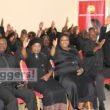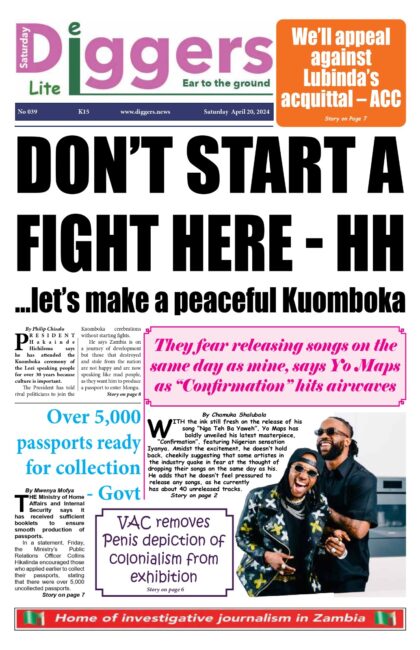The latest Economist Intelligence Unit (EIU) country report says President Edgar Lungu is likely to lose the 2021 elections if opposition political parties form an alliance.
The latest EIU country report for the year 2018 to 2022, which was generated on April 13th, 2018, suggests a potential alliance of opposition parties would make victory conceivable given a wave of anti-government resentment over taxes, subsidy cuts and joblessness.
It said the expulsion of the Cuban Ambassador, Nelson Pages Vilas by the Zambian government, is an indication that Zambia has an intolerant government which is set against underlying anti-government sentiments and is likely to trigger clampdowns on civil liberties.
“Although Mr Vilas is technically being expelled, Cuba’s reaction was not immediately clear. A breakdown in ties would not be dramatic in its effect, but Cuba has been sending doctors and free pharmaceuticals to Zambia for more than 50 years. Zambia’s government is also leaving itself open to the accusation of employing double standards, given that the ruling Patriotic Front (PF), while in opposition in 2011, invited the US ambassador to Zambia to the launch of its own election campaign. And the government at the time never expelled that diplomat. But Mr Lungu is by Zambian standards unusually intolerant of the opposition and its supporters. In many ways this is counterproductive and betrays his own fragility,” the report read.
“The Socialist Party (SP)’s launch comes as Mr Lungu faces an impeachment bid in parliament, which is rumoured to have some not-insignificant support from within the PF itself, while key members of the cabinet have resigned or been sacked and another new opposition party, the National Democratic Congress, has recently been making inroads into once-safe constituencies (although its leader was recently arrested on fraud charges). On its own the SP is too young to stand much chance at the next national elections in 2021, although a potential alliance of opposition parties would make victory conceivable given a wave of anti-government resentment over taxes, subsidy cuts and joblessness,” stated the report.
Meanwhile, the report shows that tensions between the opposition and government would continue moving in an acute trajectory, leaving the country’s political stability in a vulnerable position. The report says there would also be internal volatility within the ruling party, ahead of the nominations in 2020 of its presidential candidate for 2021.
The Economic Intelligence report further stated that Zambia would return to the hostile brand of politics and rivalry between government and the UPND if President Edgar Lungu survived the impeachment motion.
The report however says that the advanced impeachment motion against President Lungu by the opposition UPND was practically set to be abortive due to the limited number of members of parliament who would be willing to support it.
“Zambias main opposition party, the United Party for National Development (UPND) have filed an impeachment motion against President Edgar Lungu, over alleged constitutional breaches. The impeachment motion was filed before the parliamentary clerk and alleges that the president and his cabinet misappropriated state funds by illegally awarding a Chinese firm, AVIC International, prime land belonging to a college of agriculture in the capital, Lusaka, and wasting state resources through fire department tenders (42 fire trucks were bought at US$1m apiece). Symbolically, the impeachment bid is a powerful political statement, and shows that the UPND, battered by crackdowns in 2017, is still a force to be reckoned with.”
“But in practical terms it is set to be abortive. The motion collected signatures from one-third of members of parliament in the 166-seat National Assembly, but a minimum two-thirds majority would be required for it to pass in a vote. The UPND only has 47 representatives, and so even if another 30 independents and members of other opposition parties were in favour of impeachment, the motion would still need backing from one-third of the MPs of the ruling Patriotic Front (PF). It seems unlikely that such a number would be willing to jeopardise their parliamentary term by risking a snap election, especially as the government has yet to make headway on its campaign promises—namely with regards to jobs and support for new political forces is growing,” the report read.
The EIU projected that President Lungu would not allow the Commonwealth-inspired dialogue talks to succeed if he survives the impeachment motion because he is determined to not only muzzle the opposition political parties but gut them out at all costs.
“Assuming Mr Lungu survives, the impeachment bid rather stands to revive the hostile brand of politics that characterised relations between the government and UPND over 2017, a backdrop that led to the arrest of the latter’s leader, Hakainde Hichilema and culminated in the imposition of emergency powers. Scheduled talks arranged by the Commonwealth have already been postponed and the presidential spokesman, Amos Chanda, has directly accused the opposition party of using impeachment to try to derail the process. The playing field is now wide open for retaliation from the PF which, as recent experience under Mr Lungu’s rule shows, tends to be aimed at not just muzzling, but gutting the opposition whenever it becomes too outspoken,” the report read.












